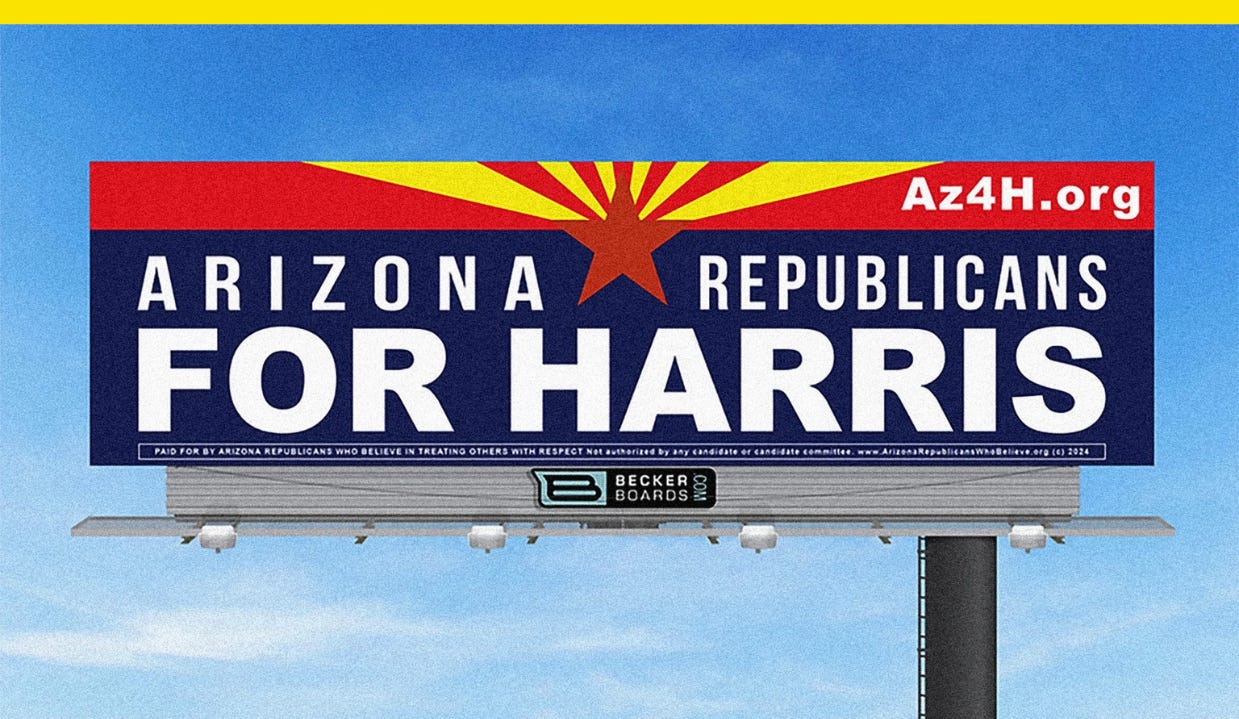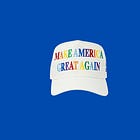How Arizona Republicans for Harris redesigned their signs so they’re easier to read
Plus: There's political ads on milk cartons now
Hello, in this issue we’ll look at how one Republican group backing the vice president in Arizona adapted their signs for the closing days of the campaign and why milk cartons in Northern California have a political ad opposing a local ballot measure.
Scroll to the end to see: “I Couldn’t Vote” stickers designed to draw attention to voter suppression. 🗳️
How Arizona Republicans for Harris redesigned their signs so they’re easier to read
Of all the swing states he lost in 2020, former President Donald Trump lost Arizona by the smallest margin. Four years later, he could win it back.
Polls have shown Trump with a narrow lead in the state, where registered Republicans and independents outnumber registered Democrats. If Vice President Kamala Harris hopes to win in Arizona, then, she needs to build a broad coalition. Luckily for her, there’s Arizona Republicans for Harris.
The all-volunteer group, a political action committee formally called “Arizona Republicans Who Believe In Treating Others With Respect,” formed during the 2020 campaign in support of President Joe Biden. That first generation of yard signs showed the Arizona flag, a well-designed and popular state symbol. But they also had a major design flaw: hard-to-read type.
The group had sized the words “Arizona” and “Republicans” in small type to fit on either side of the Arizona flag’s copper star with a small “For” and king-sized “Biden” written below the star. Now, the signs are getting a home-stretch revamp with larger type.

Since many of the group’s physical signs are vandalized or taken, it has heavily devoted resources this year into digital billboards. The group has 30 digital billboards up now in the Phoenix area, with 50 total that will be in rotation in the week before Election Day. The group has also made about 750 yard signs and about 100 larger street signs, and they expanded their sign slogans to include “Arizona Independent,” “Moderates,” and “Conservatives for Harris,” as well as their latest iteration, “Arizona Together For Harris.”
“It looks really good because ‘Together’ is just about the same length as ‘Arizona’ and so it’s really symmetrical,” Arizona Republicans for Harris member Kelli Millett tells me of the new sign. It also speaks to the group’s larger message. “Our group wants unity and hope and respect.”
Despite their early hard-to-read signs, many of which are still up on street intersections, they’ve inspired copycats with disparaging slogans, like “Incels” and “Cucks for Harris,” that mimic the “Arizona Republicans for Harris” design with the Arizona flag. Inspiring parodies is proof at least that people have been reading, but the rival signs also reveal political divisions in local neighborhoods and congregations in cities and towns like Mesa and Gilbert in the Southeast Valley.
Political yard signs in Arizona are protected by law during campaign season, and signage is a major part of political messaging in the state. Signs can sometimes turn ugly with personal attacks, especially after early voting begins, though it doesn’t have to be that way.
For Arizona Republicans for Harris, the choice to use the state flag in the sign was “a way to communicate that we’re all Arizonans no matter what political party you’re in,” Millett says, not to mention “it’s an awesome flag.”
“We’re really proud of our design. We think it’s great and it seems like a great message about Arizona,” she says.
To Arizonans, the state flag is a symbol of self-identity that lends itself well to traits like independence and bipartisanship. Arizona’s political icons are notoriously independent, like “maverick” John McCain who ran for president with the slogan “Country First,” and Sandra Day O’Connor, the first female U.S. Supreme Court Justice who was appointed by Ronald Reagan and became a key swing vote on the court. That gives the state a unique political culture. A recent survey from the nonpartisan Center for the Future of Arizona found about 60% of Arizonans want candidates who compromise and work across the aisle to find bipartisan solutions and 77% believe the state’s primary system rewards the most extreme candidates and should change.
Arizonans don’t always fit into tidy boxes—and proudly so. The state, famously, doesn’t follow daylight saving time. And no matter how Pluto’s classified elsewhere, in Arizona, it’s the official state planet (it was discovered in Flagstaff in 1930). By associating the state flag with cross-party voting, Arizona Republicans for Harris tap into a proud Arizona tradition of standing up for what you believe in, even if it isn’t popular.
There's political ads on milk cartons now
Today’s multi-platform political campaigns reach voters across television, streaming, digital, outdoor, audio, and mail advertising. And in one California county, political ads are also popping up in the dairy aisle. Clover Sonoma is utilizing its milk cartons to urge voters to reject Measure J, which would limit the size of dairies and “concentrated animal feeding operations” in Sonoma County.
“No on J,” reads the ad, first reported by the San Francisco Chronicle. “Keep Local Dairy. Keep Dairy Local.”
Milk cartons have, in the past, been used for public service announcements for missing children, but dairy packaging is an otherwise unexpected place to find anything other than nutritional information.

“We never thought we’d be making political ads, but when an activist group submitted a ballot measure that would outlaw organic, multigenerational, American Humane Certified family farms based on the number of cows they have, we knew we had to communicate our opposition on our cartons,” Michael Benedetti, a spokesperson for Clover Sonoma, told the Chronicle.
Proponents of Measure J say it would protect animals, water, and small farms, but those opposed to it include the Sonoma County Farm Bureau board president, both the county Democratic and Republican parties, and the Santa Rosa Press Democrat editorial board, which said it puts local farms at risk. The county auditor found that if passed, the ballot measure could potentially reduce sales tax revenues and increase property tax revenues.
Luckily for Measure J opponents, they also have the goodwill earned by a 108-year-old regional milk brand on their side. Clover Sonoma is known in Northern California for its mascot Clo the Cow, who appears on billboards, and the dairy’s request to its customers is for an issue that impacts them directly.
By appealing to potential voters in the dairy section with an ad that stays in the fridge until its “best by” date, Clover Sonoma has achieved the kind of targeted advertising that most political professionals can only dream of.
Have you seen this?
This brilliant new “voting” sticker is designed for the millions of people who can’t vote. The creative agency Public Domain worked with VoteAmerica to create the “I Couldn’t Vote” sticker to raise awareness about voter suppression, which impacts 30 million people according to VoteAmerica. [Fast Company]
How Republicans pushed social media companies to stop fighting election misinformation. Since 2021, the social media industry has undergone a dramatic transformation and pivoted from many of the commitments, policies and tools it once embraced to help safeguard the peaceful transfer of democratic power. [CNN]
Democratic allies promoting third-party candidates. In difficult House races in Alaska and Montana, Democratic-linked outside groups are trying to boost third-party candidates who could siphon votes from Republicans. [Politico]
Harris to make “closing argument” speech at the site of Trump's Jan. 6 remarks. The vice president plans a large rally a week before Election Day at the location in Washington where former President Donald Trump spoke ahead of the riot. [NBC News]
History of political design
Brought to you by Whig, my new newsletter about politics, First Families, and pop culture. Subscribe here.
Theodore Roosevelt bear belt buckle (1904). Roosevelt was associated with bears after he refused to shoot one on a 1902 hunting trip the year after he assumed the presidency following the assassination of William McKinley. Bears showed up on items like this belt buckle and on a match safe.
Portions of this newsletter were first published in Fast Company.
Like what you see? Subscribe for more:
Politics in the front, pop culture in the back
Subscribe to my new free newsletter about politics, First Families, and pop culture:








